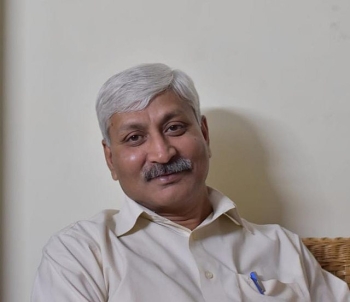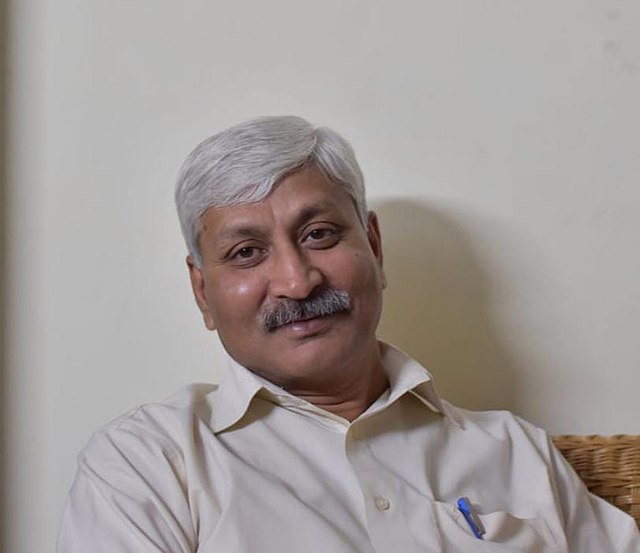
.png) Manoj Varghese
Manoj Varghese

A deliberate move is being made to rewrite the history of India through the National Council of Educational Research and Training (NCERT) textbooks in a shrewd manner. In the past eight years, NCERT has made three rounds of major changes in its textbooks; mainly in history, political science, and sociology, for students of Classes 6-12. This time the historians have raised an eyebrow over the way the facts are being distorted to brainwash the minds of young students. ‘History is created and not distorted,’ opine many scholars of history. One such name is Prof Apoorvanand of Delhi University who is vocal in articulating that “the fact will remain a fact”. He shares his viewpoint on “NCERT Textbook Revision” with Manoj Varghese of Indian Currents.
Q: To what extent is the move to rewrite the history content of NCERT textbooks justified?
A: How can it be justified? The rationalization to reduce the burden of students after the corona pandemic is completely toothless and unacceptable. The argument is not valid for the reason that it is almost two years that the pandemic is over, and the life has come to normalcy, be it the students, parents or teachers. Secondly, the changes were not announced. The claim to be an oversight is totally baseless with having three years gone. It took Ms Ritika Chopra, the National Education Editor of Indian Express, months to compare and identify those changes from the updated texts and expose it in the newspaper. Thirdly, it is part of a big game plan to impose an ideology by omitting intentionally the contents like that of the Delhi Sultanate and the Mughal Empire in the Medieval History of India from the history textbook for Class 7. Several portions of the text dealing with Mughal regime have been removed, leading to the ‘cultural connection’ of that period missing.
Q: What are the few major distortions that have been carried out?
A: Some of these changes include removing all references to the 2002 Gujarat riots, reducing content related to the Mughal era and the caste system, and dropping chapters on protests and social movements. Nathuram Godse’s affiliation to RSS has been removed, altering the motive behind the killing. Why did he kill him, has gone missing! The impression is to dilute the contributions of Muslims and other minority communities. The mentioning of democratic protests and social movements has been removed. Treating people as sovereign has been diluted at the cost of monarchial rule. Gujarat Massacre of 2002 has been eliminated, whereas the 1984 Sikh riots has been retained and figure prominently. The actual background behind such riots has gone disappearing. The ill motives of Emergency are mentioned. It has removed the description of Caste and refers to a harmonious society with no tensions. They have done away with the term ‘caste’, which means inequality. An attempt is being made to project India with an ideological origin as Hindus and others came as invaders. Everything is being referred to as the original path of Hinduism. They don’t want the students to understand the facts. The effort will lead to a mal-informed or a malnourished citizen of India.
Q: Is it a corrective measure or a deliberate move to distort the facts or an attempt by the sycophants to please their masters?
A: One can only speculate as to who had instructed it. The justification is that the learning load will be reduced. But how, is a hundred million question. The Terms of Reference is not explained, names of experts are missing and the minutes have not been circulated. Looking at the scale of changes, it reveals that it is more of an ideological change. NCERT officials have to be accountable. Even if the Government has dictated, the NCERT should justify and be held responsible for the changes made.
Q: Do you think that the move has tarnished the image of Gandhi or has helped in brand building of BJP?
A: No one can tarnish the image of Gandhiji. Assassination of Gandhiji was a shameful act and no one can cover it up. But, why was Gandhi assassinated is the fact that reveals the motive behind getting rid of a secular India. Why did Godse kill Gandhiji speaks about the ideology behind such groups.
Q: What about the other developed countries, do they also distort historical facts in the textbooks in this manner?
A: What is happening in India is nothing new. Countries like USA, Russia, China, Japan, Pakistan and others are also known for distorting facts as per the wishes and whims of the ruling party or the government. The people in power make it a point to teach what they want and, in the process, dilute the facts. The narrative on the battle among various states in USA is all manipulated and the story of Texas has been indoctrinated. Countries like Russia, China, and North Korea have full control on the stories that needs to be disseminated.
Q: What is the way out to stop such distortion in textbooks?
A: Reach out to the people with facts and figures. All the other stakeholders like media, scholars, and bureaucrats should reach out to the society and spoil this fraudulent attempt to distort the historical records. It is a good move to see that several historians have come out openly and opposed this move of NCERT.
There are reasons why political parties or the government want to control what school children read, and the present regime isn't the only one to have carried out changes in textbooks. NCERT clarified that the portions removed on Mughals were available in the textbooks of previous classes. It is good to revisit the school textbooks periodically, may be after every 10 years, to incorporate the latest technology and advanced knowledge and make them more relevant for the students. It should be done with no malafide intentions and completely in the interest of the students.